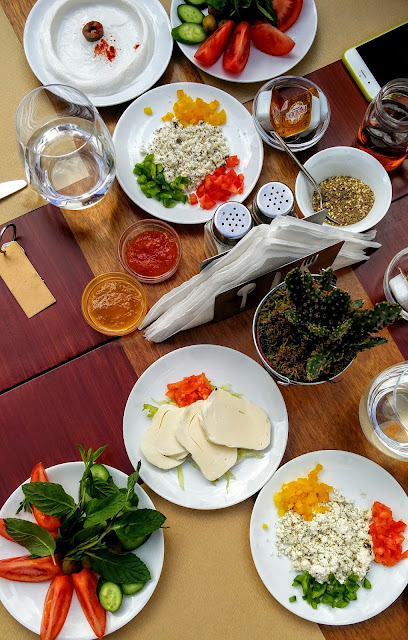Playing Tourist in Lebanon: A Weekend Escape to Via Mina Tripoli
Truth be told, it’d been five years since my last trip to
Tripoli, a coastal metropolis situated in northern Lebanon.
Though it figures as the second largest city in the country
and famously houses Kasr el Helo of A.R.
Hallab, these days Tripoli rarely comes to mind as a leisure destination. Punctuated
unrest between opposing political camps in some Tripolitan neighborhoods has
marred the area’s tourism, and few can find reason to justify the hour-and-half-long
drive from Beirut.
But the generous invitation from Via Mina, a newly-reopened boutique
hotel transformed from a century-old residence, beckoned us. A bit of Google
sleuthing portrayed the bed-and-breakfast as a sanctuary in the heart of old
Mina, a stone’s throw from the narrow corridors of the souks, and a couple
hundred meters from the corniche. We were already smitten.
Arriving on a late Saturday afternoon, with the brazen sun
still peeking through the clouds, we dropped off our bags at the reception and
made haste to the seaboard to watch night swiftly overtake day. Fresh bursts of
air, the crash of grey-blue waves against the rocky shore, seagulls and
pedestrians alike basking in unobstructed views of the Mediterranean…here was
our first taste of an unforgettable getaway.
 |
| El Mina, Tripoli, North Lebanon |
Life is calm in these parts, veering on the mystical. It’s
like taking a trip back in time to the previous century, with vendors and souk
merchants along every street corner, rock-bottom prices (cab service is 1,000
LBP), and a lulling pace. Here the air is far cleaner than in the capital,
and folks still make their livelihoods from catching fish, crafting olive-oil
soap, churning salep ice cream, or baking wheat bran pita pockets. It’s as if
history were carefully preserved and continues to play out dutifully.
 |
| Kaak is a staple in Tripoli |
Via Mina is one telling example.
You could easily stroll by without it drawing your notice. A
three-level edifice with whitewashed walls, tiffany blue shutters, and a
tranquil garden out front adorned with wooden tables and chairs combine to form
your first impression. The front door, half ajar, creates a homey feel of
welcome.
 |
| Entrance to Via Mina |
Stepping past the threshold into the foyer, we were greeted
by silver-maned Simon. He led us to our second-floor chamber, past a washroom
of brilliant mirrors reflecting off each other infinitely; past a spacious den
where you can easily curl up with a book while sipping on white tea; up the polished
wooden stairs to a room equally decked with polished wooden floors.
 |
| The winding stairway dons a European touch at Via Mina |
Inside, classic Lebanese treats – Gandour Dabke biscuits and
Unica wafer bars – bolster the local motif, and in the bathroom, toiletries are
sourced from Tripolitan soap artisans. The room is a happy medium between the
humble and luxurious, leaving little to be desired.
In the evening, we tucked into a convivial dinner at the hotel’s restaurant. The menu is decidedly Occidental, with generous
platters of steak-frites, caramelized-onion beef burgers, and lemony shrimp
pasta. Quinoa even sneaks onto the scene (who’d have thought, in Tripoli of all
places!), as do chèvre and
pesto-doused bruschetta. The produce is fresh and flavorful, the ingredients
premium. Bread rolls are supplied by haut
boulangier Prunelle, and the ice cream is unmistakably local, elastic with
mastic gum.
 |
| Goat cheese salad with fresh fruits and balsamic reduction |
The following morning, a sweet breakfast drawing on labneh, chanklish, white cheese, jams, halewe
(halvah) and honey awaited us outside on the front lawn. Fresh baked bread was
fetched by fellow guests from the souk during an early morning promenade.
 |
| A modest Lebanese breakfast |
Via Mina makes a point to employ locals, as the Ducasse-bred
hotelier Fadi Le Sidon (Sidawi) pointed out to us of the pleasant staff. They
are all smiles, full of energy, and aim to please, from the runner boys to the head janitor Elie to the valet Nizar. Attentive but never smothering, they are the right dose of hospitable.
Guests are encouraged to explore the nearby vicinity, and a
list of historical sites, churches, and mosques is provided in guestrooms. The
city is also renowned for its pottery, handmade soap, traditional Oriental
pastries, copper artifacts, and jewelry markets.
 |
| A double helix art structure titled The Tornado fashioned from computer monitors, a bicycle, and other rubbish (designed by the late local artist Mario Saba) |
What surprised me most is the vibrant
nightlife, concentrated in a quartier called Mino which counts a number of pubs
and restaurants in its midst. Mino is a mere minute by foot from Via Mina.
For guests electing to stay in and enjoy the tranquility of
the hotel, the fast Wi-Fi speed will ensure smooth connectivity (again, who’d
have guessed, in Tripoli of all places!).
I’m so grateful we overcame our hesitation to venture beyond
complacent Beirut. It’s easy to get caught up in the day to day, with
the tiring work commute, long strenuous days, and inevitable fatigue. If anything, weekend escapes in our very own Lebanese landscape become all the more
indispensable.
Put Tripoli and Via Mina on your to-do list. Start being a tourist in your own country.
Put Tripoli and Via Mina on your to-do list. Start being a tourist in your own country.
06-22 22 27 / 06-22 22 28




I want to go back :'(
ReplyDeleteThis comment has been removed by the author.
ReplyDelete